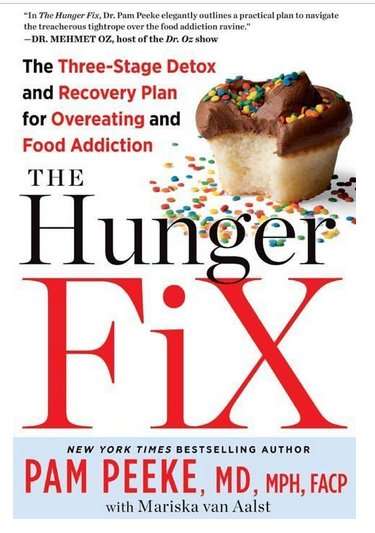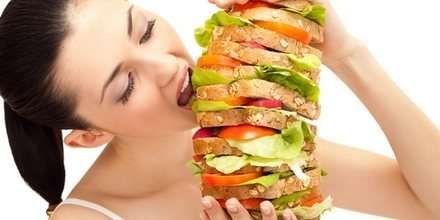In her latest book, The Hunger Fix: The 3 Stage Detox and Recovery Plan for Overeating and Food Addiction, Dr Pamela Peeke presents the latest scientific findings on food addiction.
 What’s the difference between a dose of cocaine, and a donut?
What’s the difference between a dose of cocaine, and a donut?
Turns out that there’s not much difference at all, at least when it comes to how our brains respond to them. Using either drugs or food as a stress-buster leads to a vicious cycle of mental and physical ‘dis-ease’.
Dr Peeke provides a nuanced explanation of what really happens in the heads of people suffering from an addiction, regardless of whether they are hooked on alcohol, drugs or food.
“In The Hunger Fix, Dr Pam Peeke elegantly outlines a practical plan to navigate the treacherous tightrope over the food addiction ravine.” – Dr Mehmet Oz, host of the Dr. Oz Show
In case of overeating, the core of the addiction is the abuse of hyperpalatables – foods rich in sugar, salt, fat, or starch. Consuming these foods gives a brief spell of pleasure. And people often turn to this feeling of ‘high’ to relive their stress and mental pain.

More is never enough…
The problem with these unhealthy means of soothing anguish, however, is that the over-stimulated brain responds by changing its structure. Forever on a curve of diminishing returns, the addictive substance gradually loses its pleasure inducing potency.
In other words, in order to feel the same reward the addict’s brain must increase the ‘dose’ over time. In case of food addiction and overeating, this means ever larger and larger quantities of sugary, salty, fatty or starchy foods.
3 immediate fixes: eat, exercise, meditate!
In The Hunger Fix, Dr Peeke provides a detailed program of how food addiction can be overcome by step-by-step process of detoxing and switching over to ‘healthy fixes’. Those include eating foods that make you happy and healthy, doing exercises which give you a natural ‘high,’ and practicing meditation.
Here, Dr Peeke herself practices and highly recommends the Transcendental Meditation technique.

Length: 368 pages
Author: Dr. Pamela Peeke
Published: 2012
She has conducted a pilot study on the impact of Transcendental Meditation on documented food addicts. Its result showed that TM supports addiction recovery allowing patients to stay calm in response to stress and hence stop them from ‘alleviating’ their blues wit
h an ever increasing junk food.
As reported in an interview to TM.org, this pilot study also showed that Transcendental Meditation practice increases the ability to maintain vigilance and stay in control in critical situations.
Personal experience informed by scientific rigour
Dr Peeke’s program is a very practical one, enlisting positive steps and lifestyle changes for each of the 3 stages of recovery plan. It even includes recipes to change your diet in a way that would be both fulfilling and healthy.
What’s even more – understanding the physiology and psychology behind addiction from scientific as well as from a personal perspective, Dr Peeke writes with true compassion and understanding.
As such, this book is a valuable companion to anyone looking to walk the path of recovery from the ‘false fixes’ of food addiction.
WATCH VIDEOS: Dr. PAmela Peeke on healthy eating habits and meditation practice:
https://www.youtube.com/watch?v=FhQh4ntS-30










 What’s the difference between a dose of cocaine, and a donut?
What’s the difference between a dose of cocaine, and a donut?









